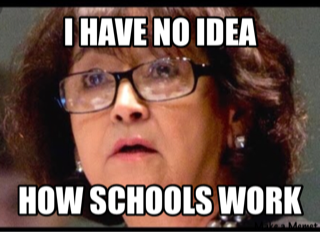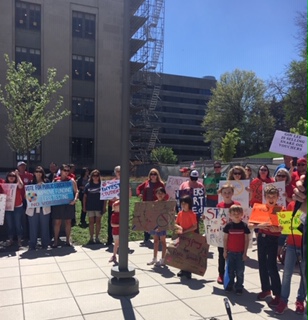A story out of Coffee County explains how Governor Bill Lee’s voucher scheme (currently under investigation by the FBI), is already impacting teacher pay raises and resources dedicated to public schools:
The day it passed in the senate, April 25 (May 1 for an amended version), the Coffee County Board of Education expressed their concerns and decided it would be more frugal to give their faculty a 1 percent raise instead of a 2 percent raise. This decision had multiple factors involved, including balancing the budget, but the uncertainty of the vouchers was part of the discussion, Aaron explained.
In Manchester, the Board of Mayor and Aldermen did not pledge money in their 2019-20 budget to assist College Street Elementary School with renovations due, in part, to the uncertainty of the voucher program as well. Alderman Ryan French pointed out the program has the potential to decimate Average Daily Attendance (a facet of BEP), which will reduce funding and therefore put more strain on the local population.
It’s still unclear what the total cost of Lee’s voucher scheme will be should it be fully implemented. Some estimates put the cost at more than $300 million. That’s a significant hit to the state’s school funding formula. Even at the conservative end of the scale, a total cost of around or just above $100 million would mean a significant loss to all districts across Tennessee. To put that amount in perspective, $100 million would fund a four percent raise for all of Tennessee’s teachers.
Lee has already demonstrated he prefers to spend money on voucher schemes and charter schools instead of teacher salaries. His initial budget proposal provided a big boost for charter school facilities while offering only a minor increase in funding for teacher salaries.

Previous analysis indicates that even if the voucher program grows only modestly, the impact to all school systems will be significant:
Nearly 15,000 students who never attended public school suddenly receiving vouchers would mean a state cost of $98 million. That’s $98 million in new money. Of course, those funds would either be new money (which is not currently contemplated) or would take from the state’s BEP allocations in the districts where the students receive the vouchers.
In other words, don’t believe the lie that just because your school district isn’t in the current voucher plan, vouchers won’t impact your schools. They absolutely will. Taking $100 million off the table means a big hit to the BEP formula, a plan that already struggles to meet the needs of our state’s schools.
For more on education politics and policy in Tennessee, follow @TNEdReport
Your support makes reporting education news possible!









